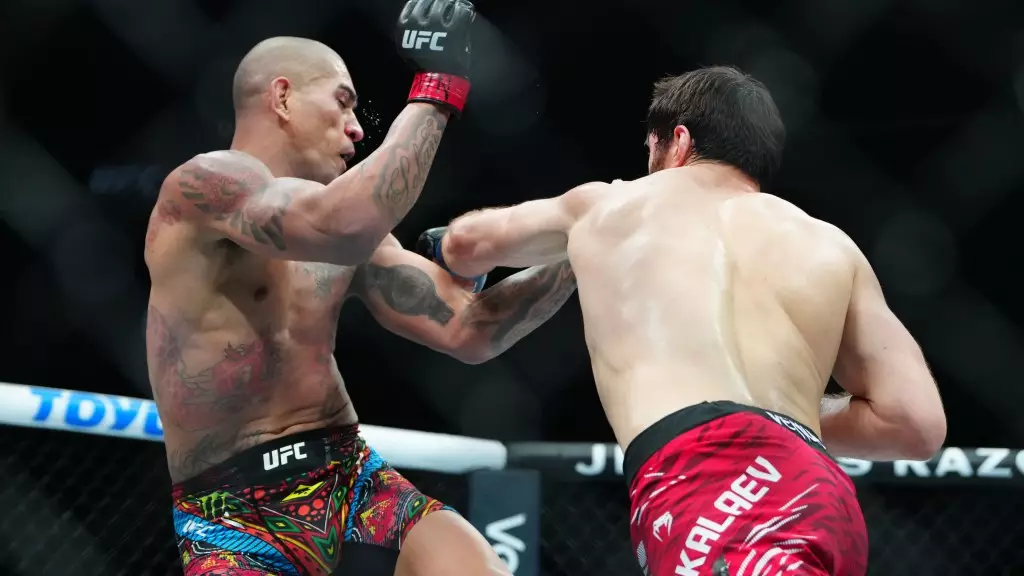The mixed martial arts (MMA) landscape is rife with tales of fighters seeking redemption following a defeat. Alex Pereira, emboldened by the hope of reclaiming his light heavyweight title, now faces a potential rematch with Magomed Ankalaev after losing their first encounter at UFC 313. The stakes are undeniably high, yet renowned MMA analyst Chael Sonnen has voiced concerns about Pereira’s inclination to jump back into the octagon against Ankalaev so soon. It is a well-trodden path in sports, but this particular journey may be fraught with peril for the Brazilian fighter.
Pereira’s recent loss, which came via unanimous decision, showed him struggling to find his footing against a disciplined and strategic opponent. Despite managing to stuff all 12 of Ankalaev’s takedown attempts—an impressive feat in its own right—Pereira was ultimately outboxed throughout the fight. This mismatch raises a critical question: What has fundamentally changed for Pereira that suggests the outcome would be different in a rematch, even after having a taste of defeat?
Evaluating the First Encounter
Sonnen, a seasoned commentator and former fighter, underscored the lack of significant competitive moments during the initial bout. He argued that Pereira lost decisively—with the score reflecting a true four rounds to one scenario. Such a gap in fight control and offensive effectiveness typically leaves little room for optimism in a rematch. One must ponder if Pereira’s faith in his ability to turn the tables is misplaced, especially when considering that Ankalaev’s fight strategy was evidently superior on that night.
In the world of MMA, rematches are often predicated on the notion that fighters learn from their losses, refining their techniques to ensure they emerge victorious next time. However, Sonnen raises an essential point: if Pereira is expected to have gained insights from the experience, why should we not grant Ankalaev equal credit for his learnings? He undoubtedly knows now what adjustments he must make against Pereira, making him a more formidable foe than before.
The Weight Class Conundrum
Another crucial factor in this equation is Pereira’s transition from middleweight to light heavyweight. Historically, such transitions can be inspired by a need to escape a division that no longer feels favorable. The narrative that Pereira “cleaned out” the middleweight division before moving up is a fallacy; he has, in truth, suffered defeats, allowing him an exodus to a new weight class. Sonnen hints at a reality that could be stark: Pereira’s climb might not represent a show of dominance, but rather a fluke opportunity arising from poor outcomes in a division where he was once the champion.
The potential for Pereira to shift to the heavyweight division may seem tempting, yet hanging on to a fading title run could jeopardize his career trajectory. The allure of stepping into the octagon against the likes of Jon Jones—or even acting as a backup fighter for heavyweight showdowns—is enticing, but repeatedly challenging for a title after consecutive losses could do far more harm than good.
Opportunities Beyond Rematches
Rather than risking a second encounter with Ankalaev, wherein the likelihood of another loss looms large, Pereira could instead capitalize on his established reputation. The UFC operates not merely on sporting prowess but also on the narratives and rivalries its fighters craft. A defeat, especially one as comprehensive as the last, does not entirely seal a fighter’s fate; opportunities are still abundant for those who can pivot their branding smartly.
Sonnen’s perspective encapsulates a broader truth: sometimes, the best course of action is strategic recalibration rather than a hasty rematch. In a sport where mental fortitude is as critical as physical ability, taking time to reassess can ultimately lead to greater success down the road. Rather than a quick return to a rematch with an equally prepared opponent, Pereira might benefit from gaining distance and reassessing his methodology, making room for growth that can lead to more significant victories and defining moments in the future.
In a sport marked by fierce rivalries and perilous stakes, the choice before Alex Pereira is emblematic of a larger dilemma athletes often face: Will he chase redemption to the detriment of his career, or will he understand the value of patience and strategic forward-thinking?

